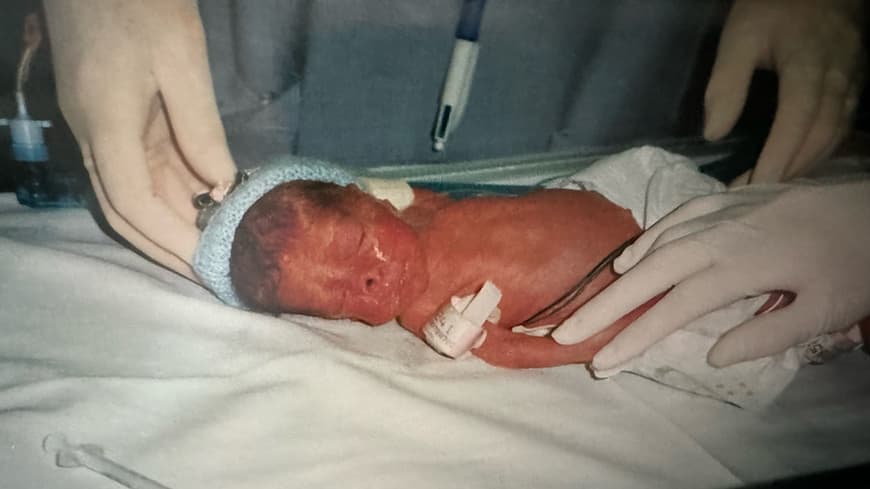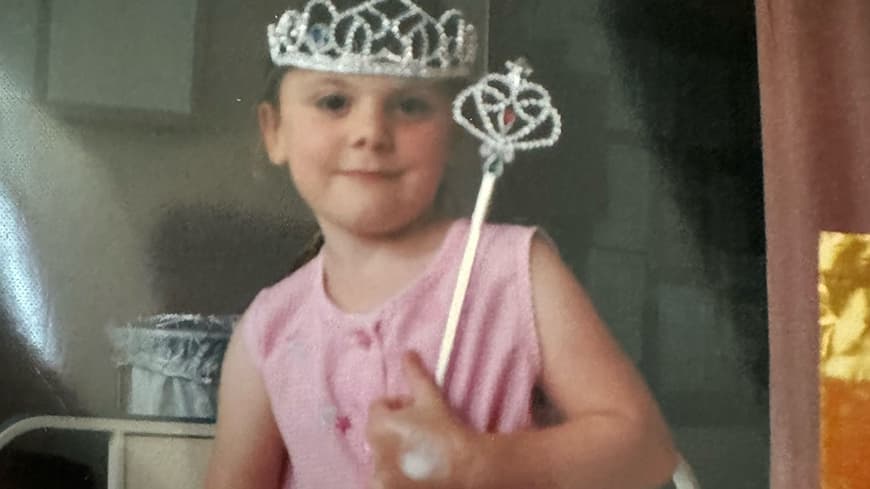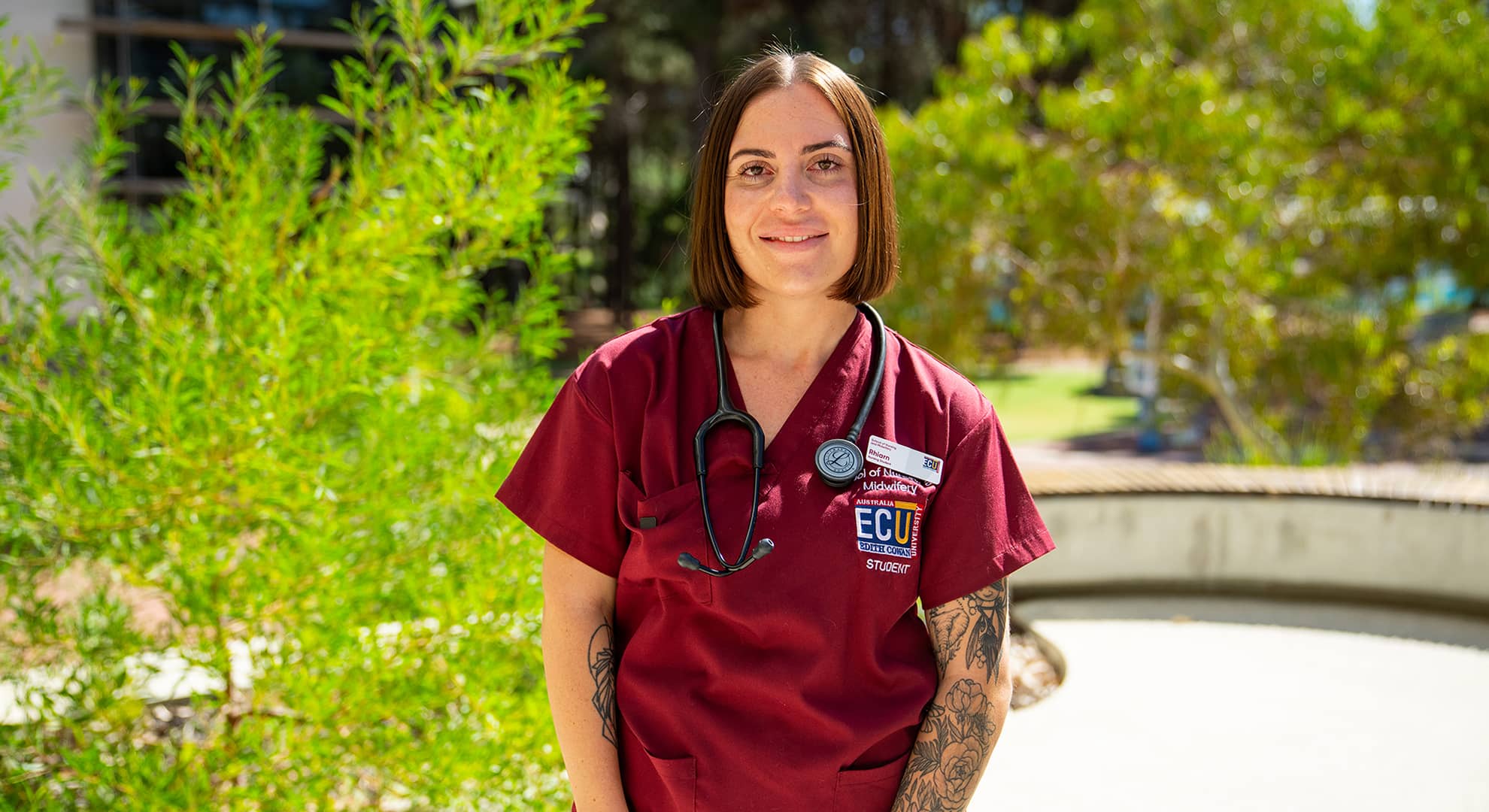Born at just 23 weeks, Rhiarn faced a harrowing series of medical complications, which resulted in long hospital stays, along with the loss of some of her fingers and toes. Despite these challenges, she emerged as a resilient, determined individual with a passion for helping others.
Her challenging early beginnings shaped who she is today.
"I was born at 23 weeks and 4 days premature. My chance for survival was slim, and I am very lucky to be alive and will forever be grateful for the team of health professionals that saved my life," says Rhiarn.
 Rhiarn was born three months premature, tiny in comparison to the hands of her carers
Rhiarn was born three months premature, tiny in comparison to the hands of her carers
Growing up, Rhiarn spent a lot of time in hospitals, which deepened her interest in healthcare. Although she had always worked in the health industry, she initially didn't think university was within her reach.
"I never thought I was smart enough to attend university," she admits. "But now, halfway through my Bachelor of Science (Nursing) degree, I've built a strong network of support, including my AMTP tutor, access and inclusion services, and academic mentors."
"I am happy I came to ECU as a mature aged student," Rhiarn said.
"I am mentally ready and have my priorities straight, and my experience in the health industry can be used during clinical placements and throughout my degree.
As a proud Ngemba woman, Rhiarn dreams of working with Aboriginal women and premature babies after completing a Graduate Diploma in Midwifery Practice.
"I want to go back to King Edward Memorial Hospital, where I was born, and help Aboriginal women and their babies," she says.
 Rhiarn grew up in and out of hospital, with a growing want to help others
Rhiarn grew up in and out of hospital, with a growing want to help others
Inspiration close to home
"My older sister recently had her first baby and went through the Aboriginal stream and had the same midwife from early on in her pregnancy until after birth.
"The whole process sparked my interest and the extra attention she got was the kind of rapport I would want to build with my patients.
Indigenous Knowledges: A Vital Component of Healthcare Education
For Rhiarn, nursing is more than just a profession — she firmly believes that Aboriginal culture's holistic view of health, which considers mind, body, and spirit, should be applied to all patients, regardless of background.
"It's highly important to include Aboriginal knowledges in the curriculum," she emphasises.
"This helps future healthcare professionals, both Australian and international, develop cultural awareness and sensitivity."
Rhiarn underscores the importance of understanding the history and impact of colonisation on Aboriginal communities and the resulting burden of disease.
"Health professionals need to be informed and empathetic, without bias or judgment. This understanding supports reconciliation by promoting awareness of the ongoing challenges Aboriginal people face."
ECU's commitment to embedding Indigenous Knowledges into its nursing and midwifery programs is key to creating a more culturally competent workforce. The University's focus on this area prepares students to provide culturally safe care and builds a healthcare system that is more responsive to the needs of Aboriginal and Torres Strait Islander communities.
Bridging Cultures: The Role of Indigenous Academics
Rhiarn's story highlights the significance of Aboriginal nurses and midwives, not only as healthcare providers but also as educators.
"Aboriginal healthcare professionals have a deep understanding of their communities' cultural practices, beliefs, and health challenges," Rhiarn says.
"As lecturers, they can bridge the gap between Western medical practices and traditional Aboriginal health knowledge, making healthcare services more culturally respectful and relevant."
ECU is currently seeking a Lecturer in Indigenous Knowledges to join the School of Nursing, offering a unique opportunity for Aboriginal and Torres Strait Islander nurses and midwives to contribute to shaping future healthcare professionals.
"This role is so important," Rhiarn explains.
"Not only can Indigenous lecturers inspire others in their community to pursue a career in healthcare, but they can also ensure that Indigenous perspectives are included in the education of future generations."
Tips for fellow students
When asked for whether she had any tip for fellow students, Rhiarn said she'd love to encourage others to embrace learning from other students and lecturers from diverse backgrounds.
"Exposure to different perspectives and experiences will enhance your understanding of patient care and prepare you for the realities of a diverse healthcare environment. Learning about diverse cultures, beliefs, and traditions will make you a more compassionate and effective healthcare provider."
Flexible and supportive
Rhiarn credits ECU's flexible study options and generous support services for giving her the confidence to work towards her dream career.
"The fact I can study online and come on to campus for my workshop once a week was a game changer, and I had no doubts I would be more than capable," she said.
"The learning and access teams assisted me in creating a personalised study plan.
"They considered my circumstances, which alleviated my stress and made me feel at ease.
"There are free psychological services and academic support programs, such as Peer Assisted Study Sessions, which I recommend to any students struggling with fast-paced tutorials, as it helps you feel more comfortable asking questions on things you don't understand.
"There is so much support at ECU – you just have to ask."
A Call to Action: Shape the Future of Healthcare
Rhiarn's journey is a testament to the power of resilience, culture, and education. Her story is one of many that underscores the importance of Indigenous Knowledges in shaping a more inclusive and compassionate healthcare system.
ECU invites Aboriginal and Torres Strait Islander nurses and midwives to consider applying for the Lecturer in Indigenous Knowledges roles in the School of Nursing.
If you're passionate about teaching, shaping the next generation of healthcare professionals, consider joining ECU.
For more information visit the ECU employment opportunities webpage.

 Rhiarn Snowden, ECU Second Year Nursing Student
Rhiarn Snowden, ECU Second Year Nursing Student


